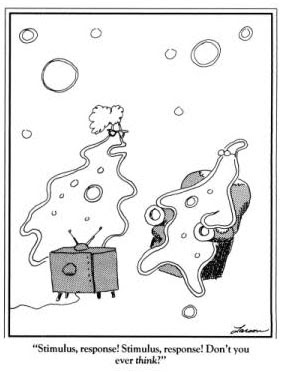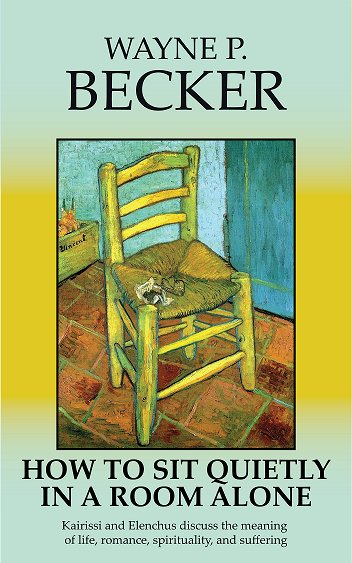|
Word Gems
exploring self-realization, sacred personhood, and full humanity
Editor's 1-Minute Essay:
Reactiveness
the slavery of inauthentic living, with programmed
response dictated by cultural conditioning, the
angry, defensive, reactive mental habit-patterns
forged by past failure, regret, fear, and guilt
return to "Reactiveness" main-page
“Retire silently, and to win, if at all, through yielding and patience; passivity has its victories more often than action… Do you have the patience to wait till your mud settles and the water is clear? Can you remain unmoving till the right action arises by itself?” Lao-Tzu
|
Editor’s note: The great thinkers instruct that our truest desires cannot be reified in this world, our short time upon planet Earth. There are too many factors against us right now: not only are we subject to oppression and injustice here, but we, ourselves, will be too immature, not only to receive and achieve authentic objects of desire but, even to know what we really want. Little wonder then that poets like Rilke assert that the Beloved might be met only in eternity. In view of all this near-term systemic dissatisfaction, Lao-Tzu’s admonition to “retire silently” and “to wait” becomes our only route to success. The ability to wait, if necessary, for long, and very long, periods of time, is a lost art; without this virtue, however, we shall remain ever disappointed; with it, all of our authentic desires will yet bear fruit.
|

This cartoon is one of my favorites of Gary Larsen’s work. I’ve remembered it for 25 years. However, as I now see, the ameba-wife’s chiding is not exactly correct: the opposite of stimulus-response is not thinking – which, in most cases, is just more stimulus-response, more programmed answer – but an absence of thinking, a shutting down of the reactive mental habit-patterns, a quieting of the mind; as we learn from Bruce Lee and Lao-Tzu.
|

"[Success is] not being tense, but ready... not being set, but flexible... it is being wholly and quietly alive, aware and alert, ready for whatever may come..." Bruce Lee
Editor's note: compare Bruce's dictum with that of Tolle:
"Their thinking, the content of their mind, is of course conditioned by the past: their upbringing, culture, family background, and so on. The central core of all their mind activity consists of certain repetitive and persistent thoughts, emotions, and reactive patterns that they identify with most strongly. This entity is the ego itself." Eckhart Tolle
|
don't wait for the other side for your life-review
People speak of undergoing a “life review” during a near-death experience or upon taking up residence on the other side. But there’s no need to wait. As I sit in judgment of my own life, I suffer distress, even humiliation, to perceive how often my person, along with the lives of those in proximity, has been poisoned by untethered reactiveness.
I could say, finally, in my old age, at least I am becoming aware of the infirmity, and greater sentience is always a big part of the solution. However, there were vast stretches of time in my youth and adult life wherein defensive anger, autonomic churlish response, like Midas in reverse, turned gold into lead for whatever I touched. I see this as one of the great curses of my time here.
Healing, concerning a character defect such as this, will be discussed elsewhere (see below); but my purpose in this short writing is to draw attention to the essential problem.
a cat never truly sleeps, is always on guard
The dysfunctional ego, the “Needy Little Me,” that darkened part of us which ever chants, “I don’t have enough” because “I am not enough,” never rests, is always on guard against possible threats. It’s like a cat that sleeps with eye-slits ajar, just a fraction, always at-the-ready against a chance of attack. When we live this way, our fears will be reflected, almost constantly, in our thinking. These fears have accumulated over a lifetime of loss and chaos in our dealings in this world. The bloom is off the rose for the ego. It trusts no one and never has a moment of peace. And, therefore, many times, its response to the world is some form of anger.
|
they bought and sold you... controlled you...

While My Guitar Gently Weeps
I look at you and see the love there that's sleeping...
I don't know why nobody told you how to unfold your love
I don't know how someone controlled you
They bought and sold you...
|
Once we become aware of how our fears have perverted us, we’ll begin to see the “calling card of death” in much of what we say and do. Notice how easily we become angry with some small slighting by another driver on the freeway; by the person who scoots ahead to the checkout at the grocery store; by the one whom you thought was a friend but doesn’t write very often; by those who play loud music in their cars or backyards.
predictable, swift, and unrelenting
This list of possible offense is endless, most of it imagined, but in any case, the response is predictable, swift, and unrelenting. It’s a disease. It’s a programming of the mind toward self-preservation - which could have some merit, but, as we analyze the incidents of “call to arms,” the vast majority of these are no threat at all but just empty drama in our own heads.
There’s much to be said here. The road to recovery comes with a very simple step: Begin to shine a mental spotlight of awareness on the machinations of the ego. As we make our way through this difficult world, reserve part of our awareness to keep tabs on what’s happening inside. They call it being “rooted in the body.” This means, monitor the inner energy. Notice how the ego is constantly trying to “take you over” and lead you into a self-defensiveness.
wholly and quietly alive
Bruce was exactly right. The idea is to become “wholly and quietly alive, aware and alert.” This is spot on and nails it. We must become “present” to our inner selves, our “true selves.” As we do, the ego will shrivel and lose power over us. But, it will not slink away quietly. It will not give up, not for a very long time, even in Summerland. The moment we lose “presence,” it will be back and take us over, and then we’ll have to pick ourselves up and start again.
The good news is that, as we grow in consciousness, its poison becomes diluted, we recover more quickly when it attacks, and the times of self-control, periods of freedom from reactiveness, true freedom, become longer and longer.
considerable difference between lovin' and likin'
|

Kairissi. “Shenandoah” was a very popular film in 1965.
Elenchus. What do you think of it?
K. While there are certain sexist comments, stereotype-thinking of that era – “women are this way, and women are that way” – there are also some deeply emotionally-moving scenes: the makeshift honeymoon-bedroom in the abandoned house;

the brutalizing of the young farm couple by war-scavengers; but, maybe the most haunting, the image of the solemn bride, sitting alone in the church, blankly staring, with her new husband having been called away to military duty immediately after the ceremony.

E. (silence)
K. However, there’s one segment of the movie that’s become somewhat well-known for its advice to newlyweds.
E. I know what you’re thinking – the “do you like her” scene.
K. I’d like to talk about that. Here’s the dialogue:

Charlie Anderson: Why do you want to marry her?
Lt. Sam: Well, I love her, Mr. Anderson.
Charlie Anderson: Well, that’s not good enough, Sam.
Lt. Sam: I beg your pardon, sir?
Charlie Anderson: Do you like her?
Lt. Sam: Well, I just said I…
Charlie Anderson: No, no, you said you loved her. There’s some difference between lovin’ and likin’… You see, Sam, when you love a woman without likin’ her, the night can be long and cold, and contempt comes up with the sun.
K. The family patriarch makes a good point. And we’ve talked about this, too, but I don’t think it’s really been settled for us: Do you like me, Elenchus?
E. (sighing)
K. I’d like you to answer me honestly.
E. (sighing) I’m not sure if we should talk about this right now.
K. (softly) I know I was unkind to you; and more than unkind… and I don’t think you’ve really forgiven me… I don’t think you like me.
E. (sighing) What do you want me to say?
K. I guess it doesn’t really matter what I want you to say; what matters is what you want to say and how you feel about me at a deeper level.
E. (silence)
K. Charlie Anderson was quite wise in drawing a distinction between “loving” and “liking.” Most couples, when they say, “I love you,” mean, “I’m physically attracted to you.” That was Charlie’s point when he said that Sam’s “I love her” is “not good enough.” The thing is, Elenchus, even a higher level love, of and by itself, is not good enough. In “The Wedding Song” we explored the real nature, the meaning, of love. We said that the essential element is that of oneness. We said that, with the discovery of the “true self,” we experience a perception of oneness, a connectedness, with everyone; but that there’s one person, the Twin Soul, with whom one shares the greatest bond of all, and therefore a sense of the greatest love. But Elenchus, I’ve learned that even Twin love, as Charlie said, is “not enough” if you don’t like her.
E. (silence)
K. I know that you love me. But, in a way, we get no credit for this. We’re Twin Souls, Elenchus. We’re each one-half of a complete individuality, so to speak. You were made to love me, almost, one could say, programmed to love me, and only me, from the “soul nursery” in the far distant past. This sense of love was a gift to us. But I now see that to “like” a girl is something different and must rise in a natural way in one’s heart and cannot be forced in a being with free-moral agency.
E. There are many things I like about you.
K. Thank you, but… you’re just being polite… you may like some things about me, but you really don’t like me, do you?
E. (silence)
K. (silence)
E. I think I will be able to like you… but, there are some things from our past that are hard for me to forget… I have trouble sometimes understanding how you could have done or said certain things which seemed to be so vicious...
K. (silence)
E. When we say that we “like” someone, usually we mean that we respect and admire the person… we also mean that we trust that person.
K. That’s probably the heart of the matter, isn’t it? You don’t really trust me, do you, Ellus? – please give me an honest answer.
E. (sighing) I suppose, right now, it’s hard for me to trust you.
K. What you mean is… “if I made myself vulnerable to you again, I can’t trust you to treasure and cherish me.” Isn’t this correct?
E. (silence)
K. And, therefore, you don’t like me.
E. I said that I believe that I will be able to like you. I just need some time.
K. I think I ruined my reputation with you. They say that in five minutes you can ruin a reputation that will take thirty years to restore… thirty years and a lot of work.
E. I think we were both very immature in those old days and caused a lot of damage to each other.
K. But, as you say, I was “vicious,” but you weren’t, and that’s the part that you can’t figure out – how I could have done and said certain things.
E. (silence)
K. One of my greatest fears is that we will go to the next world, to Summerland, where, finally, all circumstances will be perfect for our life of love… but, with all that, after all we’ve suffered, after all we've been through, all that we lost in each other... at the end, you might not want me... with nights "long and cold," and "contempt coming up with the sun."

E. Here’s what I believe. The final chapter for us has not been written. I believe in personal redemption. I believe in spiritual evolution. I believe that we can mature and change and reach an awesome human potential. Maybe you did do some things that hurt me a lot, but, as my eyes have opened, I’ve realized that any human being is potentially capable of any crime of history, if sufficiently provoked and taken over by the “false self.” Yes, ok, your unkindness was spectacular, but this doesn’t mean that the same seeds of darkness do not lurk in my own heart; assuredly, they do. I believe in you, Kriss. You are the one, the only one, whose vivifying spirit, your "extreme delight" in me, brought me to life, helped me to see clearly. And, with this enhanced vision, I see great capacity for goodness in you. I see beyond our temporary chaos. I see a glorious and sainted girl of highly developed sensibilities. This is the girl you will become. This is the girl I wait for. This is the girl I both love… and like.
K. (silence)
|
reprinted from the "simply notice" page
|
notice the mind's reaction
Some mystics speak of the principle, “chopping wood and carrying water”; meaning, in our mundane tasks of life we ought to “simple notice” the content of our minds. We should, they say, think about the wood and the water as we interact.

I would say this is not correct. Granted, we have jobs to perform – driving a car, working in an office, washing dishes, etc – and certain technical knowledge is required for many tasks of daily living, and we need to be mindful of the technical aspects at times.
But this is not what I’m talking about. In terms of a spiritually “simply noticing,” we are not to focus on content of the mind, the many aspects of “chopping wood and carrying water” which are part of this world.
notice the mind's reaction to content of the head
Instead, as we perform tasks, we are to reserve a “portion” of awareness – although, consciousness is a singularity and cannot be divided – for the mind’s reaction to content.
This is the key. Be aware of the mind’s reaction. This is what we are to “simply notice.” Some items of mental content make us happy, or sad, or fearful, or something else.
When we notice the reaction, do not judge it, or put a label on it, but simply notice it. Focus on it. Drift in the energies. Follow the current to a deeper level of the mind. Find out what’s really causing the reaction. Most times, when we peel back the layers of repression, we will discover that some hidden fear, some untoward energy of the dysfunctional ego, is manipulating us.
When you "see" the hidden fear, what’s really going on, congratulate yourself. This is a major achievement for you, an unmasking of the motivations of the ego.
Here’s the deal. When you see this in yourself, you will now possess a new “radar” with which to sense the energies of other people.
As your “vision” continues to clarify, you will read others immediately. It is the principle in the New Testament, “first cast out the log in your own eye, and then you will see clearly to help your brother.”
|
|
Editor's last word:
For further thoughts on the subject of reactiveness, see my book:

READ MORE
|
|








